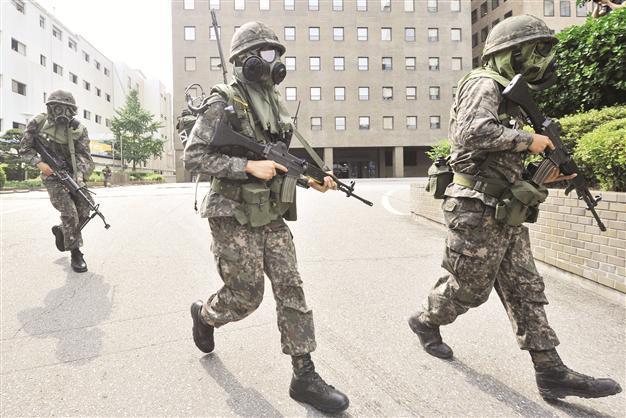North Korea warns of counter-attack on US warship
SEOUL - Agence France-Presse

South Korean soldiers wearing gas masks move to a positon during an anti-terror drill. AFP Photo
North Korea on Friday threatened to "bury in the sea" a US aircraft carrier, as it slammed a three-nation naval drill involving US, South Korean and Japanese warships.
The latest warning from the isolated regime came a day after the United States launched a two-day joint military drill with South Korea and Japan off the southern coast of the Korean peninsula.
The drill involved the nuclear-powered aircraft carrier USS George Washington, guided-missile ships, anti-submarine helicopters and early warning aircraft.
"The war drills show that the US-Japan-South Korea tripartite military alliance has developed into the nuclear war alliance and has become operational in actuality," the North's Committee for the Peaceful Reunification of Korea said in a statement.
If the three countries launch "a nuclear war while talking about 'sign' and 'preemptive attack' despite repeated warnings of (North Korea), its revolutionary armed forces will immediately mount counter-attack to bury the aggressors, provocateurs in the sea together with the carrier," it said. North Korea has repeatedly condemned joint military drills south of the border and threatened counter-attacks that have not materialised.
On Tuesday North Korea warned the United States of a "horrible disaster" over the latest drill and put its troops on alert.
US and South Korean officials have described the drill as a search and rescue exercise to improve readiness for humanitarian disasters.
Seoul and Washington last week agreed a joint strategy to address what they described as the mounting threat of a North Korean nuclear attack after Pyongyang restarted an ageing plutonium reactor.
Analysts have attributed the regime's recent bellicose rhetoric to its desire to attract the United States' attention and draw it back into dialogue.
The United States and South Korea have long demanded that Pyongyang show commitment to ending its nuclear weapons programme before six-nation talks on disarmament, which have been stalled since December 2008, can resume.
Although the North's atomic test in February -- its most powerful to date -- sent tensions soaring, the temperature has been lowered in recent months after a series of conciliatory gestures by Pyongyang towards Seoul.
But acute concerns remain over the North's nuclear programme, with South Korea's spy agency telling lawmakers on Tuesday that Pyongyang has restarted its ageing Yongbyon reactor.
